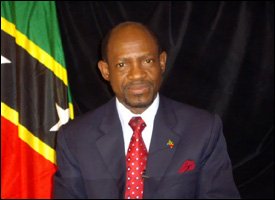
St. Kitts – Nevis’ PM – Dr. Denzil Douglas
Photo By Erasmus Williams
Basseterre, St. Kitts – Nevis
May 04, 2011 (CUOPM)
A call for a renewal and enhancement of the Caribbean’s Foreign Policy Coordination has come from St. Kitts and Nevis Prime Minister Hon. Dr. Denzil L. Douglas.
Delivering the Feature Address at the official opening of the 14th Meeting of the CARICOM Council for Foreign and Community Relations (COFCOR) at the St. Kitts Marriott Resort and Royal Beach Casino, Prime Minister Douglas said the input and recommendations of COFCOR is key and there must be an ongoing examination of the principles, practices, and mechanisms in the coordination of the approach to Foreign Policy, in the same way that there needs to be a review of the mechanisms by which the region engage Third Countries and Groups of Countries.
“As we do so, we must pay particular attention to our bilateral relations, framework agreements including Memorandum of Understanding and Co-operation Agreements; the regular scheduling of high-level meetings; the joint commission of similar mechanisms; and the accreditation of plenipotentiary representatives,” said Dr. Douglas.
He said that the challenges that the Caribbean face are real and there is the reality of increasing xenophobia.
“There is the matter of global corporate attempts – not always obvious or openly admitted – to secure, and place in private hands, fresh water sources from every continent – the “oil” of the twenty-first century. There is the issue of illegal drugs and weapons. There is global warming. All l of these challenges demand exactly what we have already committed ourselves to: serious introspection and self-analysis as a region, so that we would be able to effectively chart the type of course that we must, in order to preserve the environmental, socio-political, and economic integrity of both our individual member states, and our broader Caribbean community,” said the St. Kitts and Nevis leader.
Dr. Douglas told delegates among them representatives from the Caribbean Community as well as Slovenia, Hungary, South Africa and Australia, that co-ordination will assume an increasingly important role in the months and years ahead.
“Co-ordination in the form of joint representation, c-ordination in order to continue the adoption of joint positions on matters of regional and international import, co-ordination within the context of non-Caribbean inter-governmental organizations,” said the Prime Minister, who noted that the region is fortunate to already have in place a number of foreign policy coordinating mechanisms and structures such as the Bureau of the Conference of Heads of Government, the Bureau of the COFCOR; the regular and informal meetings of COFCOR; consultations among senior officials of Caricom member states and the Secretariat and caucuses of Caricom ambassadors in Washington, New York, Ottawa, Geneva, and Brussels.
“These we must continue to utilize and build upon, while also striving to strengthen existing ties with members of the Caribbean Diaspora whose numerical, financial, political or other strengths beyond the Caribbean, when strategically applied could redound to the benefit of the region from which they, our nationals, originated,” said Dr. Douglas.
He told the Meeting that the advantages of establishing mutually beneficial, mutually respectful relations with like-minded nations in both the industrialized and the non-industrialized world can be significant, “as we strive to develop our resources; preserve the security of the Community; and expand our economic space.”
“In this era of rapid technological changes, our relations with nations with which we can partner as we strive to develop our own technological capabilities can also be significantly advanced by the coordinated regional foreign policy orientation of which we often speak ““ as are the objectives, positions, and initiatives that we, as a region, have already identified as being key to our prosperity, stability, human resource development, and national security,” said Prime Minister Douglas, who called for a pursuit of these goals to shape and guide both the bilateral as well as the multilateral relations.
“Let us within this region, find ways, via collaboration, coordination, and ongoing communication amongst ourselves, to advance precisely those national and regional interests that we have identified as key, and which, properly pursued would provide the type of momentum that we, as policy makers, desire to see not only in terms of the process, but far more importantly, in terms of the results,” said Prime Minister Douglas.